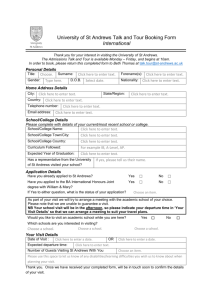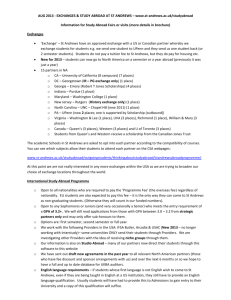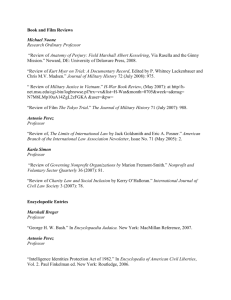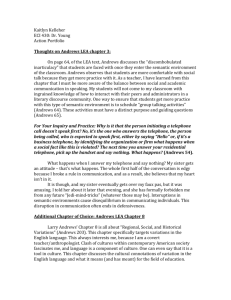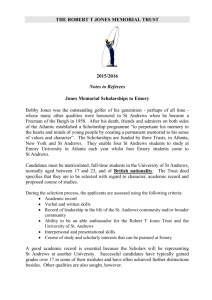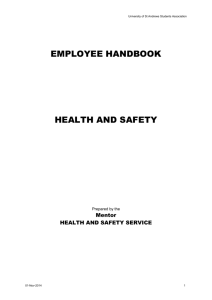Studying at University in SPAIN
advertisement
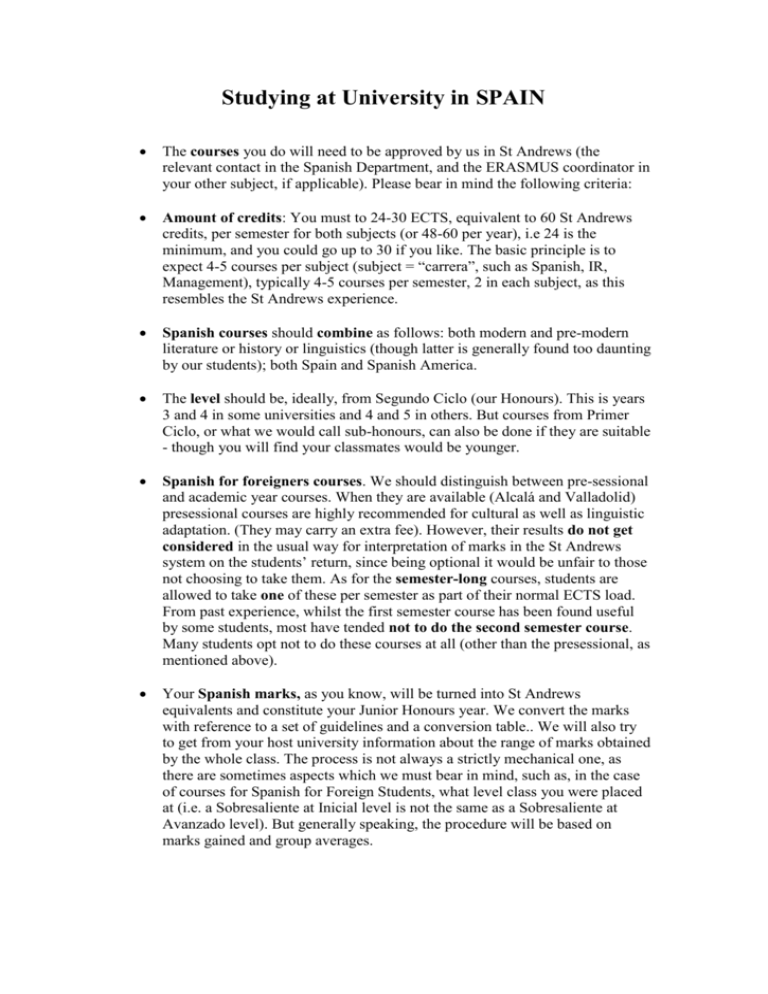
Studying at University in SPAIN The courses you do will need to be approved by us in St Andrews (the relevant contact in the Spanish Department, and the ERASMUS coordinator in your other subject, if applicable). Please bear in mind the following criteria: Amount of credits: You must to 24-30 ECTS, equivalent to 60 St Andrews credits, per semester for both subjects (or 48-60 per year), i.e 24 is the minimum, and you could go up to 30 if you like. The basic principle is to expect 4-5 courses per subject (subject = “carrera”, such as Spanish, IR, Management), typically 4-5 courses per semester, 2 in each subject, as this resembles the St Andrews experience. Spanish courses should combine as follows: both modern and pre-modern literature or history or linguistics (though latter is generally found too daunting by our students); both Spain and Spanish America. The level should be, ideally, from Segundo Ciclo (our Honours). This is years 3 and 4 in some universities and 4 and 5 in others. But courses from Primer Ciclo, or what we would call sub-honours, can also be done if they are suitable - though you will find your classmates would be younger. Spanish for foreigners courses. We should distinguish between pre-sessional and academic year courses. When they are available (Alcalá and Valladolid) presessional courses are highly recommended for cultural as well as linguistic adaptation. (They may carry an extra fee). However, their results do not get considered in the usual way for interpretation of marks in the St Andrews system on the students’ return, since being optional it would be unfair to those not choosing to take them. As for the semester-long courses, students are allowed to take one of these per semester as part of their normal ECTS load. From past experience, whilst the first semester course has been found useful by some students, most have tended not to do the second semester course. Many students opt not to do these courses at all (other than the presessional, as mentioned above). Your Spanish marks, as you know, will be turned into St Andrews equivalents and constitute your Junior Honours year. We convert the marks with reference to a set of guidelines and a conversion table.. We will also try to get from your host university information about the range of marks obtained by the whole class. The process is not always a strictly mechanical one, as there are sometimes aspects which we must bear in mind, such as, in the case of courses for Spanish for Foreign Students, what level class you were placed at (i.e. a Sobresaliente at Inicial level is not the same as a Sobresaliente at Avanzado level). But generally speaking, the procedure will be based on marks gained and group averages. You need to fill the intentions form. Second year Intentions form for year abroad options 2014-15 will be available after Intentions meeting in Semester 1. The second form is a Learning Agreement. In order to fill this one you will have to do some preparatory work by looking at the courses available on the Spanish university’s webpage, and perhaps after consulting with students who have been there. Before you fill the form itself, you should consult your St Andrews coordinator about your choice of courses, and once they are approved, you can put them on the form. You then take this form with you to Spain, and see whether all the courses desired are available. If changes are needed, and after approval by email from your St Andrews coordinator, the changes must be registered on the second page of the form, and sent back to St Andrews for signature. Do remember to let us know your address (including email and phone number) as soon as you are settled. You should email your St Andrews contacts in your Department(s) and copy the email to the following people: Samantha Lister (Collaborations and Study Abroad Office, studyabroad@standrews.ac.uk), Registry (email: registry), Ms Tammy Gray, School Office (email: tlat): all @st-andrews.ac.uk, of course. You should take your St Andrews matriculation card with you. There will be a meeting about Safety abroad organised by Collaborations and Study Abroad Office in April. You will be advised about the precise date, and your attendance is compulsory. Please read http://www.standrews.ac.uk/studyabroad/outgoingstudents/practicalinformation/livingabroa d/healthandsafety/ which aims to give further advice following the general talk that will be given to you in late April or early May before you leave St Andrews (about which the Collaborations and Study Abroad Office will give you information directly). Finally, we advise you to have a look at the film “L’Auberge Espagnole”, Dir. Cédric Klapisch. We hope you will have a similarly interesting time in your year in Spain, only that you will have to take your studies more seriously than these students do.
